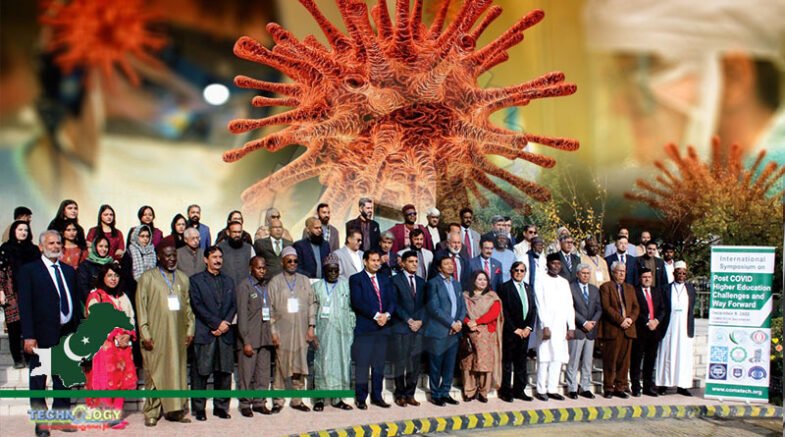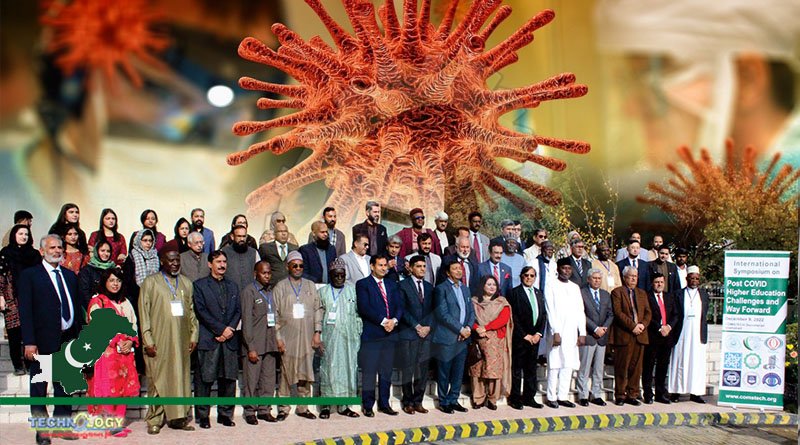Prof. Nizamuddin recommended to strive for technological advancement, building community centers and making access to higher education easy for everyone.

COMSTECH, (COMSTECH Consortium of Excellence CCoE), IUCPSS (The largest network of public universities of Pakistan), American Institute of Pakistan Studies, and The Hollings Centre for International Dialogue organized an International Symposium on Post COVID Higher Education Challenges and Way Forward at COMSTECH on Friday. Vice Chancellors/Rectors of Muslim Universities from Uganda, Nigeria, Kenya, Tanzania, Kazakhstan, and Pakistan participated in the symposium.
The Coordinator General COMSTECH, Prof. Dr. M. Iqbal Choudhary said in his welcome address that the topic of today’s symposium is both relevant and important. He said that the COVID pandemic impacted the world very profoundly. He said that the pandemic has exposed the world that no one is out there to help to combat pandemic, one has to solely rely on one’s own capabilities.
Prof. Choudhary said that science responded to the pandemic by deciphering the virus in just four months and providing vaccine in the shortest possible time to save lives. He informed that the next pandemic is being predicted in just four years-time, so we have to prepare for that in advance.
Prof. Choudhary said that the education has been given least importance. We are technologically illiterate and our competency in the use of technologies is not at par. He said that we have to adopt new normal by learning and using new technologies. He said the idea of this symposium is to discuss, debate and understand the challenges faced by the higher education and find appropriate ways to mitigate them.
Pro-Rector Superior University, Prof. Dr. Mohammad Nizamuddin said in his keynote address that we need to conduct study to find how higher education sector responded to the pandemic. He said that the quality of higher education delivery effected during the pandemic, because we were not prepared. He said in one aspect the higher education sector was benefited by the COVID pandemic and that was the initiation of hybrid system of education delivery and adoption of the technologies. Prof. Nizamuddin recommended to strive for technological advancement, building community centers and making access to higher education easy for everyone. He appreciated the online education system and recommended to adopt the online education system.
The chief guest of the concluding session of the symposium was the chairman standing committee on foreign affairs, senator Mushahid Hussain Sayed. He said like other parts of the world, COVID-19 has severely affected higher education sector in South Asia, highly populated and unique geographical region of the world, which accounts for 25% of the world population having the highest proportion of youth under the age of 18 years.
Mr. Sayed said, in Pakistan, about 47 million students have been affected including 2 million students enrolled in more than 230 universities and more than 120 sub campuses. He said that the universities across the region had to face multiple challenges during and post COVID period.
He said that a dire need is being felt to bring higher education leadership/vice chancellors across the globe on one platform not only to deliberate on post COVID higher education challenges but also suggest solutions through learning from best regional and global practices in key fields of online teaching, assessment, mental health issues and required new skills & educational pathways for students.
He appreciated the organization of this symposium as the objectives of this symposium are the need of the hour to achieve them as early as possible.
National Coordinator IUCPSS, Mr. Murtaza Noor said that the purpose of today’s symposium is to bring all stakeholder close together to discuss and find solutions to the challenges being faced by higher education section after COVID.
